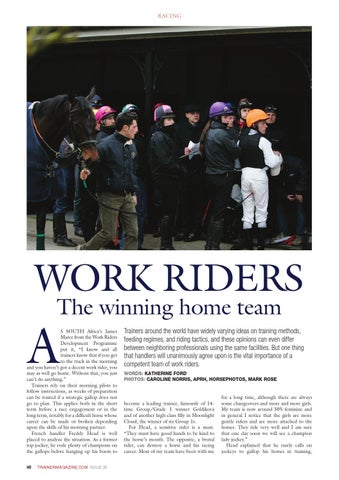RACING
WoRK RIDERs the winning home team
A
s south Africa’s James Maree from the Work Riders Development Programme put it, “I know and all trainers know that if you get to the track in the morning and you haven’t got a decent work rider, you may as well go home. Without that, you just can’t do anything.” trainers rely on their morning pilots to follow instructions, as weeks of preparation can be wasted if a strategic gallop does not go to plan. this applies both in the short term before a race engagement or in the long term, notably for a difficult horse whose career can be made or broken depending upon the skills of his morning partner. French handler Freddy head is well placed to analyze the situation. As a former top jockey, he rode plenty of champions on the gallops before hanging up his boots to 80
TRAINERMAGAZINE.COM ISSUE 36
Trainers around the world have widely varying ideas on training methods, feeding regimes, and riding tactics, and these opinions can even differ between neighboring professionals using the same facilities. But one thing that handlers will unanimously agree upon is the vital importance of a competent team of work riders. WORDS: KATHERINE FORD PHOTOS: cAROLINE NORRIS, APRH, HORSEPHOTOS, MARK ROSE
become a leading trainer, famously of 14time Group/Grade 1 winner Goldikova and of another high-class filly in Moonlight Cloud, the winner of six Group 1s. For head, a sensitive rider is a must. “they must have good hands to be kind to the horse’s mouth. the opposite, a brutal rider, can destroy a horse and his racing career. Most of my team have been with me
for a long time, although there are always some changeovers and more and more girls. My team is now around 50% feminine and in general I notice that the girls are more gentle riders and are more attached to the horses. they ride very well and I am sure that one day soon we will see a champion lady jockey.” head explained that he rarely calls on jockeys to gallop his horses in training,
